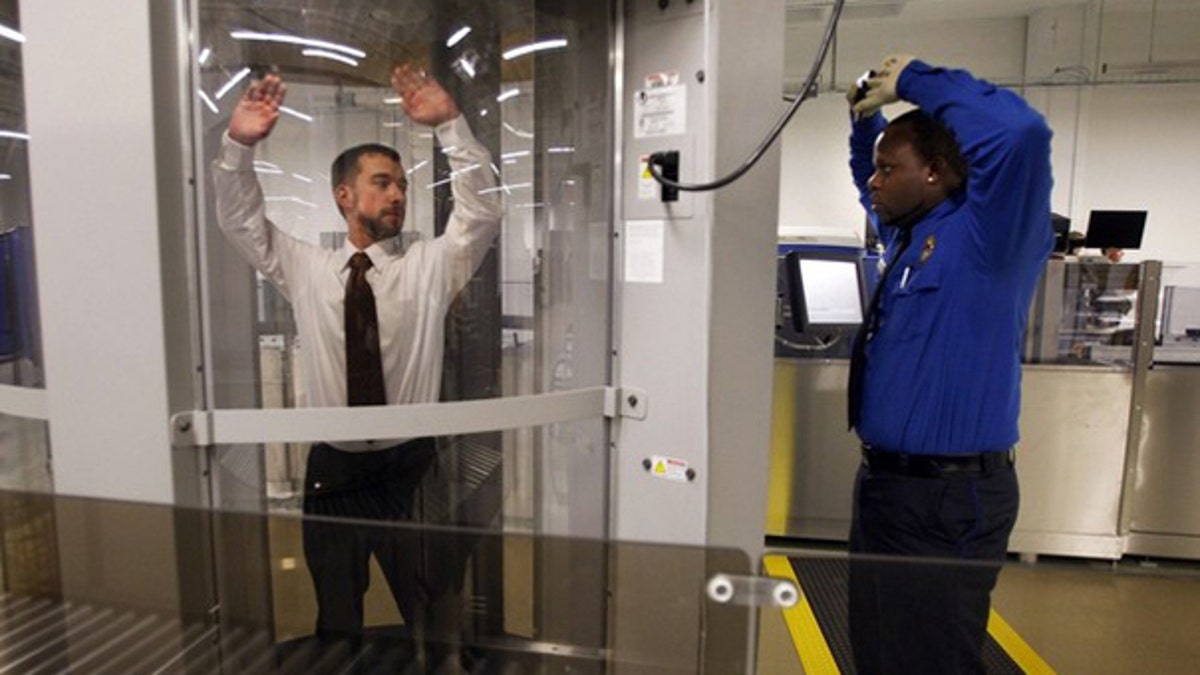
FILE: Undated: Transportation Security Administration staffers at the agency's Washington, D.C., training facility demonstrate a full-body scanning machine. (REUTERS)
The calls for airports to expand the use of full-body scanners in the wake of the attempted bombing of a Northwest Airlines flight have re-ignited privacy concerns from groups and lawmakers who have long said the scanners produce graphic images that could make their way onto the Internet.
The Transportation Security Administration currently has only 40 of the scanners in operation, but it has purchased another 150 and plans to deploy them next year. The agency plans to buy another 300 next year, and some officials are calling on the agency to move quickly in using the new technology, which allows TSA officials to peer under clothing for any contraband. It is believed that the machines would have detected the PETN explosive sewn into the underwear of the alleged would-be bomber last week.
But privacy groups have renewed their complaints about the machines. The American Civil Liberties Union on Wednesday ticked off its many misgivings with the devices:
-- They say the scanners produce "strikingly graphic images" of "virtually naked bodies";
-- They say they reveal sexual organs and "intimate medical details";
-- They say they represent an "assault on personal privacy."
"While it's important to react quickly, it's also important to react wisely and to adopt procedures that will be both truly effective and the least invasive to Americans' privacy," Michael German, ACLU's Washington legislative office counsel said in a statement.
The group wants the devices, if used at all, to be employed only when "absolutely necessary" for certain travelers.
Some officials, though, say the near-catastrophe last Friday should make privacy concerns moot.
"There have been privacy concerns expressed about the use of these whole body imaging devices, but I think those privacy concerns, which are, frankly, mild, have to fall in the face of the ability of these machines to detect material like this, explosive on this individual," Sen. Joe Lieberman, I-Conn., said on Fox News. "Just think about it. Three hundred people could have been killed and untold more on the ground in Michigan if this plane had crashed."
Former Homeland Security Secretary Michael Chertoff, in an interview with NPR, complained that the devices aren't as widely used as they should be because of "aggressive" campaigns against them from the ACLU and other groups.
The TSA currently has a number of restrictions on the machines it has in use. Only six of the 19 airports that use them employ them as the primary method of screening. Even then, the machines are optional, and passengers who don't wish to go through them can opt for a pat-down.
And the officer who helps the passenger through the machine does not view the image it produces. That image is sent to a remotely located officer in a secure room who does not actually see the passenger, according to the TSA. The technology blurs facial features, and the image is supposed to be automatically deleted. Cameras and cell phones are not allowed in the viewing room.
That might not matter to some religious groups.
Isaac Yeffet, former head of Israel's El-Al airlines, said Muslims would not stand for any widespread use of the device since it would, to some, represent a dishonor to women and their families.
"Realize that a Muslim will know that his wife was seen naked in this machine," Yeffet said. "You know what would be the reaction? ... Terrible."
Rep. Jason Chaffetz, a Utah Republican who sponsored legislation that passed the House over summer prohibiting the machines from being used as a primary method of screening, told The Salt Lake Tribune that even after the attempted bombing he stands by the legislation, which is stuck in the Senate.
"I believe there's technology out there that can identify bomb-type materials without necessarily, overly invading our privacy," he said.





















